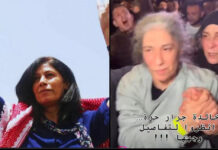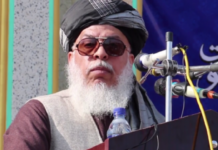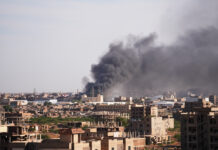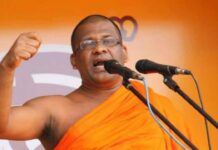It appears that Sri Lanka’s long-time leader Mahinda Rajapaksa has paid the price for authoritarian rule, nepotism and alienating the island’s minorities, including Muslims.
Official results from this week’s presidential election showed Maithripala Sirisena, a former ally of Rajapaksa, had won 51.3% of the vote.
Mr Rajapaksa, in office since 2005, said on Twitter that he looked forward to a peaceful transition of power.
His supporters credit him with ending the civil war and boosting the economy, but critics say he had become increasingly authoritarian and corrupt.
Mr Sirisena had already received promises of support from Tamil and Muslim leaders before the election.
Sri Lanka’s largest Muslim political party defected from Rajapaksa’s government to support the opposition candidate. They had more than 20 lawmakers and ministers.
 Ameer Faaiz, a leader of the party that represents 2 million Muslims in overwhelmingly Buddhist Sri Lanka, cited the Rajapaksa administration’s “intolerance toward religious minorities” and disagreement with his style of rule.
Ameer Faaiz, a leader of the party that represents 2 million Muslims in overwhelmingly Buddhist Sri Lanka, cited the Rajapaksa administration’s “intolerance toward religious minorities” and disagreement with his style of rule.
Subscribe to our newsletter and stay updated on the latest news and updates from around the Muslim world!
He said the party consulted its supporters who were of the overwhelming opinion that they could no longer stand with Rajapaksa and would throw their support behind his rival Maithripala Sirisena.
An attack on Muslims in June by Buddhists that left three dead and dozens injured exacerbated ethnic tensions in the aftermath of a decades-long civil war against Tamil Tiger rebels that ended in 2009.
Rajapaksa’s government had come under heavy criticism in recent years for backing extremist Buddhist groups and turning a blind eye to the recent anti-Muslim violence.
In the end the two biggest minorities – Tamils and Muslims – voted for Mr Sirisena in large numbers, and probably swung the vote his way. Their vote was more anti-Rajapaksa than pro-Sirisena.
Mr Sirisena was picked by the unwieldy opposition coalition for his Sinhalese appeal, and he has done little to reach out to the minorities on the campaign trail. It will be difficult for him to ignore their grievances now, including constitutional changes for a settlement of the ethnic grievances that fuelled the long war.
Questions also surround Bodu Bala Sena – the hard-line Buddhist monks’ organisation that has peddled hatred and violence against Muslims and some Christians for the past two years. Will it simply disappear with the demise of a government that – at the very least – tolerated it?
Both Mr Rajapaksa and Mr Sirisena are Sinhalese, the majority ethnic group in Sri Lanka.























Comments are closed.